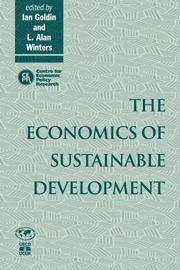Book contents
- Frontmatter
- Contents
- List of figures
- List of tables
- Preface
- Acknowledgements
- List of conference participants
- 1 Economic policies for sustainable development
- PART ONE GROWTH AND THE ENVIRONMENT
- PART TWO SUSTAINABILITY
- 4 What sustains economic development?
- Discussion
- 5 Optimal development and the idea of net national product
- Discussion
- 6 Sustainable growth and the Green Golden Rule
- Discussion
- PART THREE DOMESTIC POLICY
- PART FOUR INTERNATIONAL POLICY COORDINATION
- Index
Discussion
Published online by Cambridge University Press: 04 August 2010
- Frontmatter
- Contents
- List of figures
- List of tables
- Preface
- Acknowledgements
- List of conference participants
- 1 Economic policies for sustainable development
- PART ONE GROWTH AND THE ENVIRONMENT
- PART TWO SUSTAINABILITY
- 4 What sustains economic development?
- Discussion
- 5 Optimal development and the idea of net national product
- Discussion
- 6 Sustainable growth and the Green Golden Rule
- Discussion
- PART THREE DOMESTIC POLICY
- PART FOUR INTERNATIONAL POLICY COORDINATION
- Index
Summary
In chapter 6 the authors (hereafter BCH) discuss the implications of a new approach to analysing sustainable development captured by the use of a welfare function which is a convex combination of a discounted sum of a stream of instantaneous utilities and the lim inf of that stream of utilities. In the bulk of the chapter, this welfare criterion is applied to a model of renewable resources with capital accumulation, although in section 6 a special case without capital accumulation is solved. While the new welfare function is potentially interesting, the application with the capital accumulation has some features which I do not find compelling, while the example without capital accumulation seems to deliver fairly standard results. On the basis of these applications I find it difficult to assess how valuable this new criterion is going to prove, and I would like to see the criterion applied to a wider class of models before reaching a judgement. To amplify these points I will make some general comments about the welfare criterion and then discuss the particular applications.
The objection to the conventional discounted utilitarian welfare function is that it can sometimes produce outcomes which seem patently unjust to later generations. Consider a model with constant population, no technical progress, a nonrenewable resource which enters into a Cobb–Douglas aggregate production function. Dasgupta and Heal (1979) have shown that, with any positive utility discounting, along an optimal path consumption must tend to zero in the long run (i.e. the development plan is unsustainable). This is despite the fact that there exist other growth paths where consumption can either be maintained constant, or rise indefinitely.
- Type
- Chapter
- Information
- The Economics of Sustainable Development , pp. 166 - 172Publisher: Cambridge University PressPrint publication year: 1995



